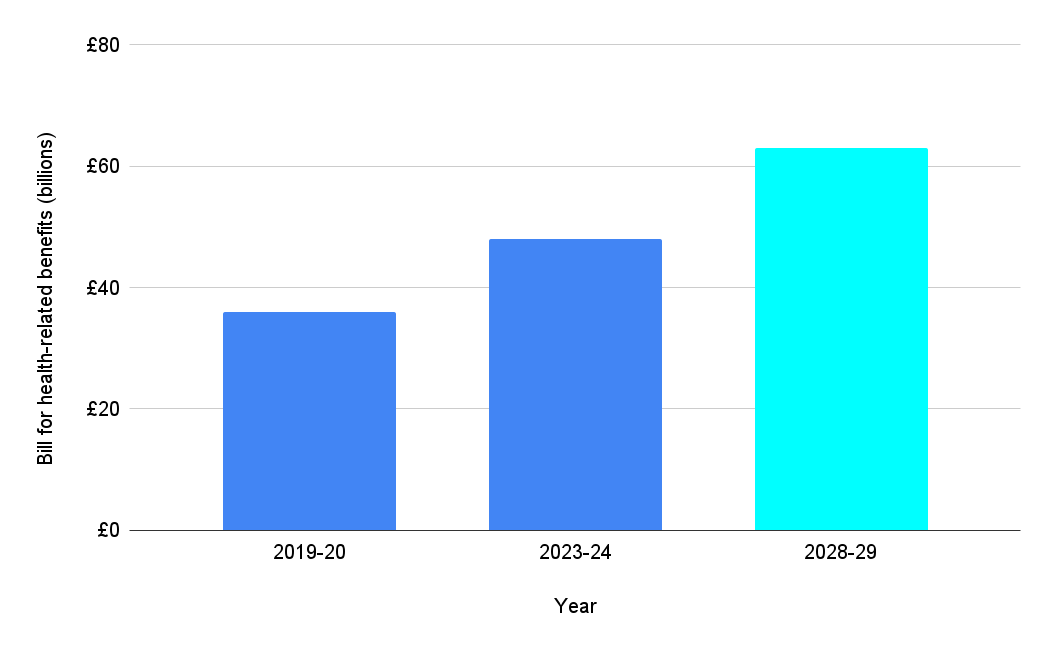Summary
- Work and pensions secretary Liz Kendall set out a series of reforms to the health-related benefits system in a Commons speech yesterday afternoon.
- The government is adopting a “carrot and stick” approach to reduce the number of people who are out of work and cut the rising welfare bill.
- Kendall said the reforms are expected to save £5 billion by 2030.
- Areas of focus include narrowing the eligibility criteria for the Personal Independence Payment (PIP), a payment made to people with long-term physical or mental health conditions who need help with everyday tasks or getting around.
- Work Capability Assessments (WCA) will also be scrapped by 2028. This assessment is used to determine whether someone on Universal Credit is able to work, potentially entitling them to a top-up.
- Meanwhile, a “right to try” scheme will be introduced, which will allow people to attempt a return to the workplace without losing their entitlements.
- Kendall also announced a permanent, above-inflation rise to the standard allowance of Universal Credit (a £775 annual increase in cash terms by 2029/30).
- Kendall's announcements come a week after prime minister Keir Starmer referred to the existing system as “the worst of all worlds”. Starmer added that the “wrong incentives” were “discouraging people from working”, leaving taxpayers “funding a spiralling bill”.
- The government is under pressure to cut spending in order to meet its fiscal rules, with high borrowing costs and weak economic growth having eroded chancellor Rachel Reeves's fiscal headroom ahead of the Spring Forecast on 26 March.
- There is also an increased focus on upping defence spending in the face of America’s retreat from Europe.
| What is the Spring Forecast? | Spring Forecast pension announcements? | Spring Forecast cash ISA rumours |
Good morning. The government is expected to outline a series of benefit reforms today to cut the rising welfare bill and get more people into work. Work and pensions secretary Liz Kendall is expected to address the House of Commons at around 12.30pm this afternoon.
It comes just over a week before chancellor Rachel Reeves’s Spring Forecast. The government is under pressure to meet its fiscal rules. With high borrowing costs and weak economic growth having eroded Reeves’s fiscal headroom, spending cuts appear to be on the table.
The team at MoneyWeek is reporting live.

Above: Work and pensions secretary Liz Kendall leaves after attending the weekly Cabinet meeting at 10 Downing Street this morning.
Government has been hinting at spending cuts
The government has been laying the ground for spending cuts through a series of comments in recent days, with a particular focus on health-related benefits.
Speaking to Labour MPs on Monday, 10 March, prime minister Keir Starmer described the current system as the “worst of all worlds”.
He said: "We've found ourselves in a worst-of-all-worlds situation – with the wrong incentives discouraging people from working, the taxpayer funding a spiralling bill.
“A wasted generation, one-in-eight young people not in education, employment or training, and the people who really need that safety net still not always getting the dignity they deserve.”
As well as cuts, incentives to help people get back into work are expected to form part of the package of reforms announced by Kendall later today. More details to follow.
Benefits overhaul: what policies are expected?
Several details have emerged in recent days, with Kendall expected to take a “carrot and stick” approach to encourage more people back into the workplace. This could include:
- Personal Independence Payment (PIP) cuts: In a controversial move, Kendall is expected to make it more difficult to qualify for PIP. Politico reports that this could save the government around £5 billion. PIP is currently available to those with long-term physical or mental health conditions who need help with everyday tasks or getting around. The benefit is not currently tied to employment status. It helps to cover the additional costs that can come with having a disability.
- Universal Credit reforms: Kendall is also expected to announce that unemployed people on Universal Credit will see their benefit payments rise, if they are actively looking for work. Meanwhile, a £416.19 monthly top-up that is paid to people who are long-term sick or disabled could be frozen next year, or even cut.
- “Right to try” scheme: Several reports also point to the introduction of a “right to try” scheme, which would allow those on long-term sick or disability benefits to attempt a return to the workplace without fear of losing their entitlements.
- Redirection of funds: The government is expected to channel some of these savings into helping people get off benefits – as much as £1 billion, according to The Sunday Times. The paper also reports that some of the savings may be spent on raising the basic rate of universal credit for those deemed fit to work.
Rise in number of people getting health-related benefits
The Institute for Fiscal Studies (IFS) points to a “significant rise” in the number of people receiving health-related benefits. “In England and Wales, four million 16 to 64-year-olds (1 in 10) now claim either disability or incapacity benefits, up from 2.8 million in 2019 (1 in 13),” the independent body said.
More than half of the rise in 16-64 year olds claiming disability benefits since the pandemic is linked to mental health or behavioural conditions. Mental health struggles are on the rise and sufferers often point to limited access to services like counselling.
Total health-related benefits spending for all ages has increased from £52 billion in 2019-20 to £65 billion in 2023-24, IFS figures show.
Among those of working age, the bill has increased from £36 billion in 2019-20 to £48 billion in 2023-24. Official forecasts expect this to hit £63 billion by 2028-29.
Figure 1: The bill for health-related benefits among the working-age population is forecast to hit £63 billion by 2028/29

Work and pensions secretary Liz Kendall is currently addressing the Commons. We will bring you the latest updates as they are announced.
Focus on “prevention” and “early intervention”
The social security system will always be there for people in genuine need, Kendall said. She added that the government’s first aim would be to make a “decisive shift” towards “prevention and early intervention”.
“Almost four million people are in work with a work-limiting health condition and around 300,000 fall out of work every year, so we’ve got to do far more to help people stay in work and get back to work quickly,” she added.
The chances of returning to work are five times higher within the first year, the government claims.
Keeping people in work
Kendall referred to several government initiatives that are intended to keep people in work, including making Statutory Sick Pay available to “one million of the lowest paid workers”, as well as rights to more flexible working.
She also referred to the “Work Well” programme which will include new approaches like GPs referring patients to employment advisors rather than signing them off sick.

Above: Rights to flexible working will help keep more people in work, the government has said.
Work Capability Assessment scrapped in 2028
Kendall has announced that WCAs (Work Capability Assessments) will be scrapped in 2028, and that the government will legislate for a “right to try”, “giving people confidence to take the plunge and try and work without putting benefits at risk”.
Universal Credit to have a “permanent above-inflation” increase
The announcements keep coming thick and fast – the work and pensions secretary has now moved onto Universal Credit.
She tells the Commons: “We will bring in a permanent, above-inflation rise to the standard allowance in Universal Credit… for the first time ever, a £775 annual increase in cash terms by 2029/30.
“And a decisive step to tackle the perverse incentives in the system.”
Those with severe disabilities will “never be reassessed” to give them the “confidence and dignity they deserve”
Kendall’s package of reforms will “fix the failing system of reassessments,” she said. The government claims the Conservatives “failed to switch reassessments back on” after the pandemic. Reassessments are down by more than two-thirds and face-to-face assessments have fallen from seven in 10 to one in 10, Kendall added.
The government plans to switch reassessments back on “at scale”, including boosting face-to-face appointments. These will be “recorded as standard to give confidence to claimants and taxpayers”.
Meanwhile, people on Universal Credit with severe disabilities that won’t improve will “never be reassessed to give them the confidence and dignity they deserve”, Kendall added.

Above: The government plans to increase the number of face-to-face appointments when carrying out eligibility assessments.
Eligibility criteria for the Personal Independence Payment (PIP) will be tightened
There had been speculation that PIP would be means-tested but Kendall said this would not happen – and it won’t be frozen either.
However, she did announce a change in legislation. “Our reforms will focus support on those with the greatest needs,” she told the House of Commons.
“We will legislate for a change in PIP so people will need to score a minimum of four points in at least one activity to qualify for the daily living element of PIP from November 2026.
“This will not affect the mobility component of PIP and only relates to the daily living element.”
There will also be a review of the PIP assessment process. Kendall said the government had to “make sure PIP is fit for purpose now, and in the future”.
The reform package is expected to save more than £5 billion in 2029/30 – “and the OBR will set out their final assessment of the costings next week,” added Kendall.
Government to consult on merging Jobseeker’s Allowance and Employment Support Allowance
The government’s so-called Green Paper will consult on a major reform to contributory benefits, looking at merging the contributions-based Jobseeker’s Allowance and Employment Support Allowance.
The idea is that these would be turned into a new time-limited unemployment insurance, paid at a higher rate, without having to prove you cannot work. “If you have paid into the system, you will get stronger income protection while we help you get back on track,” Kendall said.

Just to recap, these changes are being announced just over a week before chancellor Rachel Reeves delivers her Spring Forecast. The government is almost certainly trying to free up some fiscal headroom in light of high borrowing costs and weak economic growth.
MoneyWeek contributor Matthew Lynn argues that Reeves is "sleepwalking into an economic catastrophe". Will this prove correct?
Read his opinion piece here: "Is Rachel Reeves leading the UK to a spring crisis?"

Above: Chancellor Rachel Reeves will deliver her Spring Forecast on 26 March.
Tories: “Welfare cuts are too little, too late”
Shadow work and pensions secretary Helen Whately says she agrees with Liz Kendall that the welfare bill is too high.
“Spending more on sickness benefits than we do on defence is not the sign of a strong country,” she argues.
Whately said that “at every point” over the past 14 years Labour had opposed Tory plans to overhaul the benefits system.
She adds that the best way to bring down welfare costs is by getting people off benefits and into work – which, she says, the Conservatives did “year after year”.
The senior Tory MP said Labour’s announcements raised “more questions than answers”, and that it was “fundamentally too little, too late”.
Lib Dems: Government must “get serious about fixing health and social care”
The Lib Dems have issued a press release with their reaction.
Work and pensions spokesperson Steve Darling said: “If the government was serious about cutting welfare spending, it would get serious about fixing health and social care and the broken Department of Work and Pensions.
“That is why it has been so disappointing to see the government’s lack of urgency in this area, putting their social care review on a three-year timeline, kicking projects like new hospitals into the long grass, and still no overhaul of the department.”
He added that “until that changes, no meaningful drop in the welfare bill will arrive, and the misery that people are suffering will continue”.
Mental Health Foundation: Reforms are “disjointed and ultimately counterproductive”
Mark Rowland, chief executive at UK charity the Mental Health Foundation, has criticised Kendall’s reforms.
“People who are too unwell to be able to work deserve a welfare system which prioritises helping them recover and return to work when they are able to,” he said.
“While parts of today’s announcements, such as the ‘right to try’ scheme, the uplift to Universal Credit, and the reduction in harmful reassessments make a move towards this, packaging these alongside draconian cuts to support is disjointed and ultimately counterproductive.”
Rowland has also challenged the restrictions targeted at young people, after the government announced it would consult on preventing under-22s from claiming the health element of Universal Credit.
“Young people are particularly vulnerable to both financial hardship and poor mental health,” he said, adding that they “deserve the same support and compassion as people with long-term health conditions of any age”.
The government’s argument is that being out of work when you are young is particularly damaging to your future prospects. Kendall said she wants every young person to be “earning or learning” and “on a pathway to success”.
Framing cuts as a solution to incentivise work is “misplaced”
James Watson-O’Neill, chief executive at the national disability charity Sense, says that trying to frame cuts as a solution to incentivise work is “misplaced”.
He points to the Personal Independence Payment (PIP) as an example of this. “PIP was never designed to help people find work. It’s about helping disabled people cover the extra costs of living with a disability, which often enables them to stay in employment,” he says.
Watson-O’Neill adds that the government needs to “focus on removing the barriers that disabled jobseekers face”.
Work and pensions minister Liz Kendall has indicated that this is something the government is looking into through programmes like “Work Well”, which is trialling new approaches like GPs referring people to employment advisors instead of signing them off sick.
However, the implication from charities like Sense is that more tailored support is needed. For example, Watson-O’Neill calls for a “nationwide rollout of assistive technology in job centres” and “much more targeted training for work coaches to support disabled people’s unique needs”.
Thank you for joining us on our live blog today. That concludes our coverage of the government's welfare reforms.
We will be back with another live blog tomorrow, sharing our preview analysis ahead of Thursday's UK interest rate decision. Markets and economists believe the Bank of England will keep rates on hold. Are they right? We will be sharing all the details. Have a lovely evening.
Good morning and welcome back to our live blog. In the time since we signed off yesterday evening, Labour’s minister for social security and disability, Stephen Timms, shared his reaction to the proposed benefits cuts.
Timms told LBC: “I was pleased with the general response from Labour MPs and others in the House of Commons yesterday. I think most people recognise we do need to reform the system.”
In another interview, he said the government is considering extending Disability Living Allowance to parents in the case of the death of a child that they have given up work to care for.
“One thing we are looking at is, and we’re taking legal advice about this at the moment, the possibility of extending Disability Living Allowance for children, the benefit that’s paid when children are very unwell, for a period after the child’s death,” he told Sky News.
Stick with us for full details and expert commentary on how the welfare reforms will be implemented.
Insurance industry looks to work with government on welfare reform
The Income Protection Task Force has written to prime minister Keir Starmer requesting the government and insurance sector work together “to create a system that is fairer, more resilient, and ultimately better for those who need it most”.
The letter highlights how protection products can play a key role in providing financial security, rehabilitation, and early intervention – “crucial for reducing long-term welfare dependency and supporting individuals back to work.”
Could protection products be key to beating the benefit cuts?
The cuts to welfare support show the importance of having insurance in place while you are healthy.
No one wants to think about developing a health condition but products such as income protection can support you if you need time off work for recovery, while critical illness can provide support if you can no longer work at all.
Premiums can be as low as £20 a month, making it worth it if you can get a large payout and especially if state benefits such as Universal Credit will be lower and Personal Independence Payments will be harder to apply for.
Human resources trainer Kate Underwood said: “With benefit cuts looming, employees without a financial safety net face real risks. For employers, this isn’t just a welfare issue – it’s a workforce one. Rising stress and financial insecurity lead to higher absenteeism and lower productivity.
“These days, income protection, critical illness cover, and even access to financial advice are proving far more valuable to employees than free gym memberships and the occasional box of donuts. Offering real financial security isn’t just a perk – it’s a business-savvy move to keep teams stable and focused.
“Insurance won’t erase benefit cuts, but it can soften the impact – for everyone.”
Steve Humphrey, founder of The Mortgage Pod, added: “With the government tightening welfare benefits, having financial protection like income protection, critical illness cover, and life insurance is more crucial than ever. These products provide financial stability if illness or injury prevents work, especially as state support becomes harder to access.
“Preparing early is key, as waiting until health issues arise can make cover more expensive or unavailable. Given potential family medical histories and reduced government aid, securing protection now ensures long-term financial security and peace of mind.”
Thank you for joining us today. We will be closing down this blog as we end our live coverage of Labour’s benefit reforms this week.
However, we are back with another blog, sharing our preview analysis ahead of the Bank of England’s interest rate decision. Experts are confident UK interest rates will be held at 4.5%, but are they right?
The MoneyWeek team will be reporting live as it happens. Find out below:
Live: Bank of England expected to hold UK interest rates tomorrow
Have a lovely evening.
